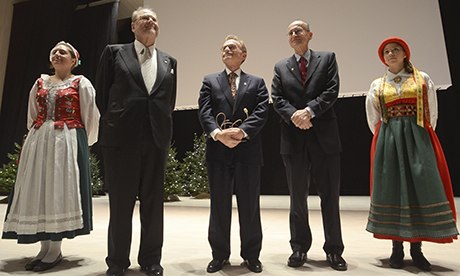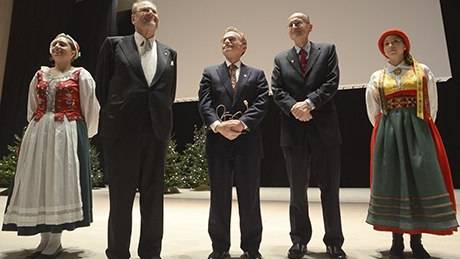Nobel winner declares boycott of top science journals - Nature, Science

Nobel laureate and biologist Randy Schekman has taken a stand and declared that luxury scientific journals are not furthering proper scientific method and are instead catering to trendy science, corrupted by a "tyranny" of "impact factor".
He’s calling for a boycott on ’peer-review’ science publications such as Nature, Cell, and Science which often obstruct true and valuable research in favour of supporting mainstream political and scientific consensus.
Bravo!
["But is it peer reviewed?" - Fraud and Science]
Red Ice Creations has visited the issue of mainstream scientific censorship in our article "TED: Some ideas TOO fascinating - Hancock, Sheldrake’s censored talks"
And while fingers are being pointed at ’luxury’ science journals, so too should the call go out on the Nobel prize itself - the world’s most prestigious peace prize. While many worthy candidates have been nominated over the years, selections of the so-called ’champions of peace’ by the Peace Prize Committee have sometimes been seen as "collective insanity". From winners such as US President Obama (before he even took office), former US Vice President Al Gore, Henry Kissinger, and the bureaucratic body of the European Union - it’s clear that the prize is awarded not to recognize any kind of peace, but for the cachet it brings in political circles and foundation funding.
More on Schekman and the boycott of science journals...
---
Nobel winner declares boycott of top science journals
By Ian Sample | The Guardian
Leading academic journals are distorting the scientific process and represent a "tyranny" that must be broken, according to a Nobel prize winner who has declared a boycott on the publications.
Randy Schekman, a US biologist who won the Nobel prize in physiology or medicine this year and receives his prize in Stockholm on Tuesday, said his lab would no longer send research papers to the top-tier journals, Nature, Cell and Science.

Randy Schekman, centre, at a Nobel prize ceremony in Stockholm.
Schekman said pressure to publish in "luxury" journals encouraged researchers to cut corners and pursue trendy fields of science instead of doing more important work. The problem was exacerbated, he said, by editors who were not active scientists but professionals who favoured studies that were likely to make a splash.
The prestige of appearing in the major journals has led the Chinese Academy of Sciences to pay successful authors the equivalent of $30,000 (£18,000). Some researchers made half of their income through such "bribes", Schekman said in an interview.
Writing in the Guardian, Schekman raises serious concerns over the journals’ practices and calls on others in the scientific community to take action.
"I have published in the big brands, including papers that won me a Nobel prize. But no longer," he writes. "Just as Wall Street needs to break the hold of bonus culture, so science must break the tyranny of the luxury journals."
Schekman is the editor of eLife, an online journal set up by the Wellcome Trust. Articles submitted to the journal – a competitor to Nature, Cell and Science – are discussed by reviewers who are working scientists and accepted if all agree. The papers are free for anyone to read.
Schekman criticises Nature, Cell and Science for artificially restricting the number of papers they accept, a policy he says stokes demand "like fashion designers who create limited-edition handbags." He also attacks a widespread metric called an "impact factor", used by many top-tier journals in their marketing.
A journal’s impact factor is a measure of how often its papers are cited, and is used as a proxy for quality. But Schekman said it was "toxic influence" on science that "introduced a distortion". He writes: "A paper can become highly cited because it is good science - or because it is eye-catching, provocative, or wrong."
Daniel Sirkis, a postdoc in Schekman’s lab, said many scientists wasted a lot of time trying to get their work into Cell, Science and Nature. "It’s true I could have a harder time getting my foot in the door of certain elite institutions without papers in these journals during my postdoc, but I don’t think I’d want to do science at a place that had this as one of their most important criteria for hiring anyway," he told the Guardian.
Sebastian Springer, a biochemist at Jacobs University in Bremen, who worked with Schekman at the University of California, Berkeley, said he agreed there were major problems in scientific publishing, but no better model yet existed. "The system is not meritocratic. You don’t necessarily see the best papers published in those journals. The editors are not professional scientists, they are journalists which isn’t necessarily the greatest problem, but they emphasise novelty over solid work," he said.
Springer said it was not enough for individual scientists to take a stand. Scientists are hired and awarded grants and fellowships on the basis of which journals they publish in. "The hiring committees all around the world need to acknowledge this issue," he said.
[...]
Read the full article at: theguardian.com
Tune into Red Ice Radio:
Rupert Sheldrake - The Science Delusion
Johan Oldenkamp - Hour 1 - Wholly Science
Gregg Braden - Crisis in Thinking & False Assumptions of an Incomplete Science
James Follett - The Church of Global Warming
Tim Ball - Climategate & The Anthropogenic Global Warming Fraud
Graham Hancock - Entangled, Supernatural, Shamanism, The Origins of Consciousness & The Destiny of America






















